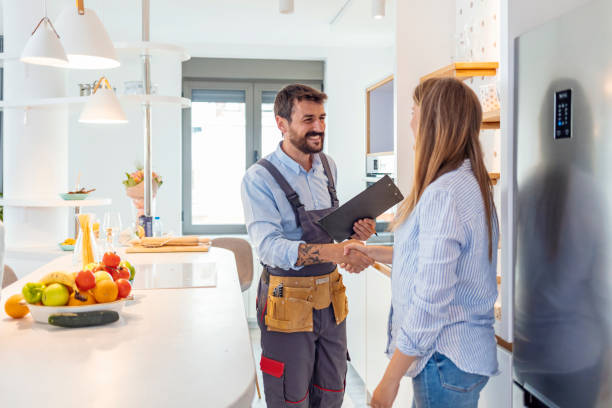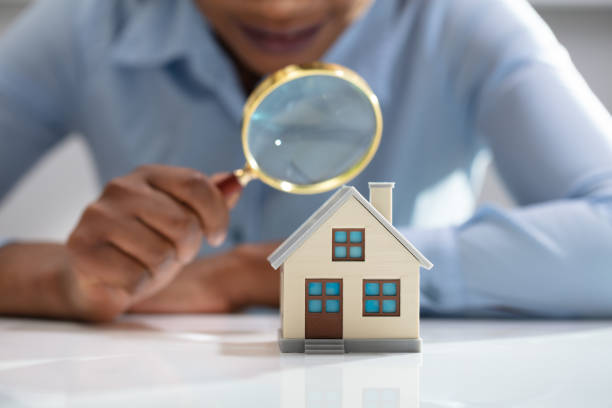Our Home Inspection Services
Residential Home Inspections
A sight-based, non-invasive assessment of multiple unique parts of the residence is what constitutes a residential home inspection. Whenever accessible and safe to do so, a proficient and licensed house examiner from Louisville, Colorado House Evaluators will inspect the dwelling from the footing to the top. This covers plumbing, HVAC equipment, electric circuits, and other areas. It is crucial to recall that the inspector won't be moving any items or different belongings to access difficult-to-reach places, so homeowners looking to sell should get ready for the inspection.
New Construction Inspections
The inspection entails a detailed assessment of the house's conveniently reachable vital components, including the HVAC, electrical, plumbing, and appliances.
A Louisville, Colorado House Evaluators inspection covers many ancillary parts in addition to the significant operating or visible elements and systems.
Once all utilities have been switched on, we also examine for more usual issues. Each outlet is scrutinized to make sure the wiring is installed correctly. All windows and doors will also be inspected closely to make sure they are simple to open and close. To make sure there is enough insulation installed, the attic will be checked.
We want to make sure you obtain the full , professional home inspection you need to confidently acquire your new house.
Specialized Inspections (e.g., mold, radon, termite)
The Environmental Protection Agency (EPA) recommends radon testing when selling all new or old homes. Radon is a harmful gas generated when uranium decays and penetrates a home through small cracks and openings. Radon levels are notably high in areas where granite is present. Additionally, the presence of mold, fungus, and mildew can represent a health risk in a home, and homes should be checked to find out the type of mold growing in a home.
Our inspectors can perform swab and air sampling to determine the type of mold and the amount of mold growing in the home.
Pre-purchase and Pre-sale Inspections
Our {pre-sale & pre-purchase|pre-listing & pre-buying|before selling & before buying} structure assessments look at the building's intactness and status to determine whether a property adheres with the required building codes.
The property inspection will be performed by one of our professional and qualified building inspectors, who will also give a detailed written building report within a quick period of the inspection.
The findings and a synopsis of the procedures used to evaluate the building will be clearly stated in the report on the building inspection. It incorporates a detailed assessment on particular safety dangers, clear large damages, and general minor flaws. Wherever a significant flaw or danger is identified, the building inspector will document its location and describe why it qualifies as a significant issue
Condo and Apartment Inspections
Discovering an experienced professional is an essential part of purchasing a condo, and we are proud to offer this in excess.
The condo inspection encompasses checking the crawl space from the entrance and the attics directly attached to your unit to ensure a firewall is installed and no major problems are visible (both areas are common areas of the complex and are serviced by). the Union).
The inspector will also examine basements, garages, and common areas bordering to the unit. Although these common areas do not always directly impact your property, you may still have to pay for them through special assessments.
Inspection Reports and Formats
An inspection documentation form is a standardized document used to record and report inspection results. It commonly consists of a checklist or series of questions about the items or locations being inspected. The home inspection report is commonly around 20 to 30 pages.
The inspector recognizes and reports the condition of the items that make up a home. All of these elements are categorized into four key segments.
The main components are structural, electrical, plumbing, and climate control (HVAC).

About Our Home Inspeection Services In Louisville, Colorado.
From the beginning, many of the finest real estate brokers and agents in Louisville, Colorado have chosen us as their go-to inspection company thanks to our passion for quality. We abide by the InterNACHI Code of Ethics and Standards of Practice.
We also supply coverage for errors and omissions, general liability, and negligent responsibility. Every customer will obtain the best examination we can offer at a budget-friendly price, that's our aim!
Why Choose Us?
Our inspectors undertake detailed evaluations, find hidden problems, and furnish complete reports with their unmatched knowledge and wealth of experience to ensure your peace of mind in every step of your property purchase or upkeep.
As we work to take the lead the industry in utilizing the best technology and providing the most transparent and thorough house inspections possible, think of us as the future generation in quality home inspections.

Frequently Asked Questions about our Home Inspection Services in Louisville, Colorado.
What are the things you should do to prepare your house for a home inspection?
- Start by giving your home a thorough cleaning, inside and out. This will help to make sure that the inspectors can see everything clearly and that they aren't turned off by any dirt or grime.
- Make any necessary repairs. If there are any broken windows, torn screens, leaky faucets, or anything else that needs to be fixed, resolve it before the inspection.
- Take a close look at your home's electrical system. Make sure all outlets are working and that there are no exposed wires.
- Inspect your plumbing to ensure that there are no leaks or other problems.
- Take a look at your home's heating and cooling system to make sure it is in good working order.
- Be sure to have your home's paperwork in order. This includes things like your home's deed, mortgage information, insurance policy, and so on.
- Finally, make sure you are present during the inspection. This will give you an opportunity to answer any questions the inspector may have.
What are the common problems associated with home inspection?
- Rundown roofing
- Drainage issues
- Faulty foundation
- Waterworks problems
- Pest infestations
- Hidden mold
- Broken heating systems
- Electricity concerns
- Structural damage

What are 5 things that are crucial for you that a home inspector checks before purchase of your home?
Our skilled team are highly proficient in this job that they can't perform an inspection without following the laid-down procedures, rules, and guidelines.
The five critical elements that they examine in a building are;
- The Foundation of the house
- Roof integrity and performance
- Plumbing works
- Electrical systems
- Climate control
How long does a home inspection take?
Typically, the inspection of a building by an inspector with the right knowledge and equipment like our personnel takes 150 minutes. The inspector will look at the condition of the home, both inside and outside. They will also check the home's systems, such as the electrical, plumbing, and heating/cooling systems.
What are the questions to ask when evaluating a home inspection company?
- How many inspections do you perform in a day and how long do you expect to be present at the house you are inspecting for me?
- Are you a full-time home inspector, and can you provide some insights into your experience and the number of inspections you've conducted?
- Besides your license, what credentials and certifications do you have?
- Are you comfortable with me attending throughout the inspection?
- When can I anticipate receiving the inspection report following the inspection?
- Do you participate in any payment or referral programs, either as the giver or receiver?
- Do you engage in selling, trading, or sharing clients' personal information with third parties for any form of compensation, free services, or marketing endeavors?
- Could you provide me with a copy of your home inspection service agreement for my reference?
- Is it feasible to receive a sample inspection report for a home similar to the one I'm having inspected?
- Do you intend to walk on the roof? Under what circumstances do you not walk on the rooftop during an inspection?
- Do you carry General Liability Insurance? Errors and Omissions?
- Have you ever had a complaint filed against you or been disciplined by your state licensing agency, inspection association or any bona fide consumer agency? If so, what was the outcome?
- What is the anticipated cost of my inspection, and can you outline the services included in the standard fee as well as any additional services that come with extra costs?

What should be included in the inspection checklist?
- Surroundings
- Buildings
- Containers
- Wiring and electrical
- Firefighting apparatus
- Hand tools
- Hazardous products
- Handling of materials
- Protective gear
- Pressurized machinery
- Production tools
- Personnel support equipment
- Powered equipment
- Warehousing spaces
- Walkways and roadways
- Protective barriers
- Safety devices
- Controls
- Lifting components
- Cleanliness and initial medical aid provisions
- Psychosocial hazards
Is it possible for a home to fail an inspection?
Certainly, it is possible for a home to not meet the standards of an inspection. A home inspection is a close inspection of the condition of a home. It is usually conducted by a qualified examiner who will look at various aspects of the home, including the structure, the plumbing, the electrical system, and more. If any of these areas are found to be in disrepair, the home may fail the inspection.
Do I have to be there for a home inspection?
Home inspections are a vital component in the home-buying process. They help you to identify potential problems with the property and allow you the opportunity to ask questions about the condition of the home. However, you are not required to be present for the inspection.

